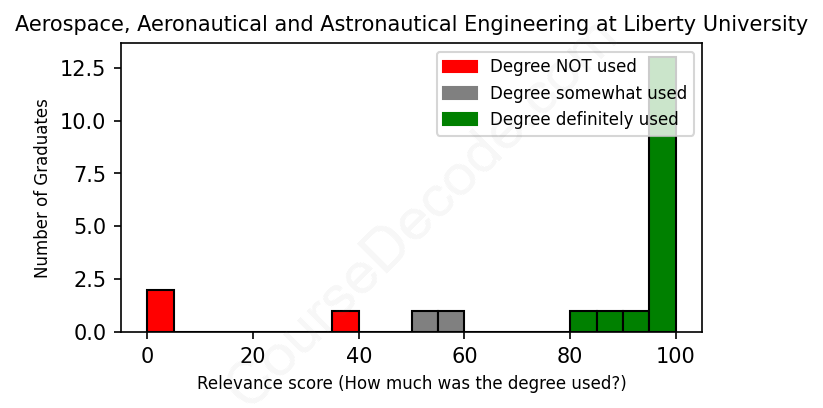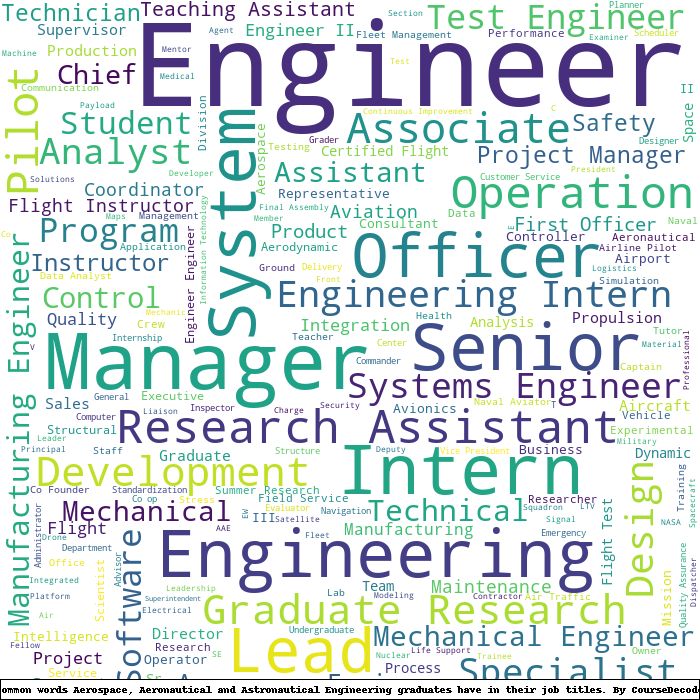
First, some facts. Of the Aerospace, Aeronautical and Astronautical Engineering graduates from Liberty University we've analyzed , here's how many have used (or NOT used) their degree in their career:

These are estimates based on AI analysis of 21 LinkedIn profiles (see below).
The verdict? Significantly above average. Overall, with an average relevance score of 81%, Aerospace, Aeronautical and Astronautical Engineering graduates from Liberty University have a much higher likelihood (+14%) of finding work in this field compared to the average graduate across all fields:
And for comparison, here's the chart for all profiles we've looked at across all degrees.
Also, after graduating, only 4% of these graduates have pursued further education other than another Bachelor's degree (such as a Masters degree or other), compared to the average across all profiles of 35%. This suggests a Bachelors degree is enough for most Aerospace, Aeronautical and Astronautical Engineering graduates, and it's normal to look for work straight after graduation.
See the details:
|
Relevance score: 0% We think this person has NOT gone into a career related to their degree. We think this person has NOT gone into a career related to their degree.
DEGREE INFOGraduated in 2022 from Liberty University with a Pursuing Bachelor's degree, Airline Transportation Certificate in Aerospace, Aeronautical and Astronautical Engineering. No other secondary education since. JOB HISTORY SINCE GRADUATIONSWAT Fairfax County Government Oct 2022 - Present ABOUTWith over 24 years of experience in law enforcement, I am an experienced SWAT Officer of over 14 years and a Patrol Officer who holds a TS clearance at Fairfax County Government, where I serve and protect the community with professionalism and integrity. I have received multiple awards for meritorious actions. In addition, I am pursuing a Bachelor's degree in Aeronautics at Liberty University, with a passion for aviation and aerospace science and technology. I have a strong background in military service, having served in the United States Marine Corps, gaining combat experience. I have also worked as a Police Detective and a Task Force Officer for the FBI, where I collaborated with federal agents and local authorities on various investigations and operations. I am a dedicated and versatile officer with a diverse range of skills and expertise, who can adapt to any situation and challenge. I am committed to advancing my knowledge and skills, and to making a positive impact on the society and the environment. |
The top 10 most common jobs done by the graduates we've analyzed (ranked most common to least) are:
After looking through the LinkedIn profiles of graduates from Liberty University with degrees in Aerospace, Aeronautical, and Astronautical Engineering, it seems that a substantial number of them have ended up in aviation-related roles, particularly as pilots. You'll find many have taken positions like First Officers, Captains, or Flight Instructors, which are highly relevant to their education. These jobs directly leverage their technical knowledge and skills from the degree, making them a perfect fit for graduates looking to soar high in the aviation industry.
However, not all graduates have stuck to the aerospace path. Some have ventured into roles that don’t capitalize on their engineering background, such as positions in quality assurance in technology firms or even roles in finance. These jobs might require analytical skills, but they don’t directly involve aerospace principles. In a nutshell, while many graduates are thriving in aviation and aerospace, there is a noticeable mix of roles that stray from core aerospace engineering, indicating that while their degree provides a solid foundation, various career paths can be pursued beyond the skies.
Here is a visual representation of the most common words in job titles for Aerospace, Aeronautical and Astronautical Engineering graduates (this is across all Aerospace, Aeronautical and Astronautical Engineering graduates we've analyzed, not just those who went to Liberty University):

From the LinkedIn profiles of graduates from Liberty University with degrees in Aerospace, Aeronautical, and Astronautical Engineering, it's clear that many have taken to aviation or aerospace-related careers quite successfully. In their early careers, graduates often start as flight instructors or in entry-level pilot positions, which aligns well with their training and education. For example, several individuals gravitated towards roles such as certified flight instructors and first officers at airlines shortly after graduation. This is a common trajectory for many, especially those who have a passion for flying and want to build their hours and experience before moving into more advanced duties or higher ranks in aviation.
Looking further ahead, about five to ten years post-graduation, many graduates have progressed into more significant roles, such as captains at major airlines, maintenance officers in the military, or specialized pilots for air ambulance services. A few have ventured into positions that blend their tech know-how with aviation, like quality assurance roles in engineering firms or even becoming consultants in aviation technology. However, it's worth noting that some graduates have veered off into unrelated fields, reflecting the idea that not every aerospace degree guarantees a clear path in aviation or engineering. Overall, while there are instances of graduates finding themselves in roles outside their field, many have landed successful careers that leverage their aerospace training.
So, here’s the deal: a Bachelor’s degree in Aerospace, Aeronautical, or Astronautical Engineering is generally pretty tough, and Liberty University is no exception. You’re diving into a lot of advanced math and science, like calculus, physics, and fluid dynamics, which can definitely be challenging for a lot of students. The workload is often heavy, with complex projects and design work that require a good amount of time and dedication. It’s definitely not a walk in the park, but if you're passionate about it and willing to put in the effort, you'll find it super rewarding. Just be ready for some sleepless nights and cramming before exams!
Most commonly, in the LinkedIn profiles we've looked at, it takes people 4 years to finish a Bachelor degree in Aerospace, Aeronautical and Astronautical Engineering.
Based on the career paths of these Liberty University graduates, it looks like many of them have landed some decent jobs, especially in aviation and aerospace roles, which often pay pretty well. For example, roles like airline pilot and quality assurance lead position them in potentially high-paying sectors, especially as they gain more experience. Even some newer grads are stepping into solid positions right away, like first officers and captains, which are great for building their resumes and salary potential. However, there are a few who have bounced around between less stable positions, like maintenance tech or district leader, which might not pay as well. Overall, though, it seems like a lot of these grads are on a good track to make decent money in their fields, especially as they build their skills and advance in their careers.
Here is a visual representation of the most common words seen in the "about" section of LinkedIn profiles who have a Bachelor degree in Aerospace, Aeronautical and Astronautical Engineering (this is across all Aerospace, Aeronautical and Astronautical Engineering graduates we've analyzed, not just those who went to Liberty University). This may or may not be useful:

Here are all colleges offering a Bachelor degree in Aerospace, Aeronautical and Astronautical Engineering (ordered by the average relevance score of their Aerospace, Aeronautical and Astronautical Engineering graduates, best to worst) where we have analyzed at least 10 of their graduates:
| College | Score | Count |
|---|---|---|
 Texas A&M University Texas A&M University
|
87 | 22 |
 California Polytechnic State University-San Luis Obispo California Polytechnic State University-San Luis Obispo
|
86 | 12 |
 University of Cincinnati University of Cincinnati
|
86 | 10 |
 Purdue University Purdue University
|
85 | 40 |
 Rensselaer Polytechnic Institute Rensselaer Polytechnic Institute
|
85 | 17 |
 Georgia Institute of Technology Georgia Institute of Technology
|
84 | 23 |
 Liberty University Liberty University
|
81 | 21 |
 Iowa State University Iowa State University
|
80 | 16 |
 University of Colorado Boulder University of Colorado Boulder
|
80 | 13 |
 California State Polytechnic University-Pomona California State Polytechnic University-Pomona
|
79 | 13 |
 United States Naval Academy United States Naval Academy
|
77 | 12 |
 The Ohio State University The Ohio State University
|
76 | 20 |
 University of Central Florida University of Central Florida
|
75 | 25 |
 Arizona State University Arizona State University
|
74 | 12 |
 University of Michigan University of Michigan
|
74 | 10 |
 Embry-Riddle Aeronautical University Embry-Riddle Aeronautical University
|
71 | 163 |
 Penn State University Penn State University
|
68 | 12 |
 Florida Institute of Technology Florida Institute of Technology
|
67 | 20 |
 The University of Alabama in Huntsville The University of Alabama in Huntsville
|
67 | 11 |
 Embry Riddle Aeronautical University-Worldwide Embry Riddle Aeronautical University-Worldwide
|
66 | 10 |
 University of Illinois at Urbana-Champaign University of Illinois at Urbana-Champaign
|
48 | 10 |